
Here are our top choices to begin your reading, or to fill out what you have already read:
This is the sanest and most comprehensive treatment of racial differences that I've read. It puts race into an international context, and debunks and clarifies what we know, what we think we know, and what we cannot know about race. Highly recommended.
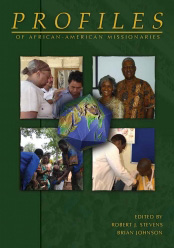 Published in 2012, lives of missionaries from the 1700s to the present are collected into this useful volume.
Published in 2012, lives of missionaries from the 1700s to the present are collected into this useful volume.
Buy now from the William Carey Library
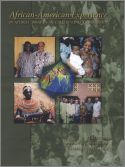 Venture into the world of overseas missions from an African-American perspective. This collection of articles takes you deep into the history of missions in the African-American community. You will learn of the struggles to stay connected to the world of missions in spite of great obstacles. You will read of unique cultural experiences while traveling abroad. You will feel the heart for fulfilling the Great Commission both in the African-American community and beyond.
Venture into the world of overseas missions from an African-American perspective. This collection of articles takes you deep into the history of missions in the African-American community. You will learn of the struggles to stay connected to the world of missions in spite of great obstacles. You will read of unique cultural experiences while traveling abroad. You will feel the heart for fulfilling the Great Commission both in the African-American community and beyond.
Buy Now from the William Carey Library
 Surgeon Michael Johnson has served many years in Kenya. With honesty, irony and pathos, he describes his call to missions, his attempt to negotiate the call, and his experiences with mission agencies, missionaries and those he serves. Here is a candid, and sometimes humorous chronicle of the cost of following Christ among the economically poor. This 2008 revised edition of his very insightful and provocative book What Jesus Wouldn't Do: Making the Lame Man Blind can be purchased from Amazon by clicking here.
Surgeon Michael Johnson has served many years in Kenya. With honesty, irony and pathos, he describes his call to missions, his attempt to negotiate the call, and his experiences with mission agencies, missionaries and those he serves. Here is a candid, and sometimes humorous chronicle of the cost of following Christ among the economically poor. This 2008 revised edition of his very insightful and provocative book What Jesus Wouldn't Do: Making the Lame Man Blind can be purchased from Amazon by clicking here.
Also, you can read articles from Dr. Johnson here on our website and visit Those Peculiar Johnsons.
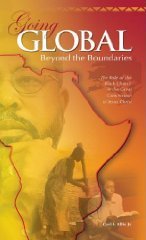 This book is an exploration to rediscover the significance of the African American church's role in the Great Commission of Jesus Christ. Traced is the history of the spiritual foundation laid by our pre-20th century forefathers' involvement in global missions. It also explores how we must build upon that foundation today and diligently work to fulfill the mandate of Christ.
This book is an exploration to rediscover the significance of the African American church's role in the Great Commission of Jesus Christ. Traced is the history of the spiritual foundation laid by our pre-20th century forefathers' involvement in global missions. It also explores how we must build upon that foundation today and diligently work to fulfill the mandate of Christ.
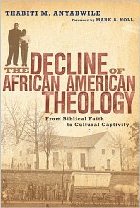 In this book, Thabiti Anyabwile offers a challenging and provocative assessment of the history of African American Christian theology, from its earliest beginnings to the present. He argues trenchantly that the modern fruit of African American theology has fallen far from the tree of its early predecessors. In doing so, Anyabwile closely examines the theological commitments of prominent African American theologians throughout American history.
In this book, Thabiti Anyabwile offers a challenging and provocative assessment of the history of African American Christian theology, from its earliest beginnings to the present. He argues trenchantly that the modern fruit of African American theology has fallen far from the tree of its early predecessors. In doing so, Anyabwile closely examines the theological commitments of prominent African American theologians throughout American history.
Chapter by chapter, he traces what he sees as the theological decline of African American theology from one generation to the next, concluding with an unflinching examination of several contemporary figures. Replete with primary texts and illustrations, this book is a gold mine for any reader interested in the history of African American Christianity.
Martin Luther King Junior is often quoted as saying he intended to ‘comfort the disturbed and disturb the comfortable'. It is in this same sense that he went on to describe himself as a maladjusted person in one of his essays on nonviolence. In this essay, Dr. King writes thusly:
Modern psychology has a word that is probably used more than any other word. It is the word "maladjusted." Now we should all seek to live a well adjusted life in order to avoid neurotic and schizophrenic personalities. But there are some things within our social order to which I am proud to be maladjusted and to which I call upon you to be maladjusted...., I call upon you to be as maladjusted as Amos who in the midst of the injustices of his day cried out in words that echo across the generation, "Let judgment run down like waters and righteousness like a mighty stream..."
We are familiar with Jesus' parable of the talents. But the passage as I read it lacked a little punch to it. So, in the margins of my own Bible I added one more servant to the passage. This guy was given not five, not two and not one talent. This servant that I added was given 20 talents. Yeah, I know I am not supposed to add to the Bible, but its only in the margins so I think I am okay.
Anyway, it just so happened that this guy took his talents and did not invest it like the other guys, nor did he hide it under a rock. Instead, he had a party! It was a great party. Everyone who was anybody, or thought he was anybody came to the party.
Matthew 15:3-9
One of the most frustrating things to me when talking to men and women of African descent is this constant use of the term; "motherland". I have actually come to hate that term. Maybe that is not what I mean. I guess I hate the way the term is tossed about like something of great dignity and pride, but there is no real commitment to anything other than lip-service to this glorious motherland. I would say to most people of African descent who use this term' I am glad I am not yo' momma!"
I cannot weep with you brothers as I have already spent my emotion. While home in the US for a few weeks, I continued to make appeals to my kinsmen of the African diaspora. The responses I get are amazingly disappointing. The complaints are myriad. Malpractice is too high, office expenses must be met, no one to cover me. It goes on and on. Your complaints are real and legitimate. It is difficult for me to get broke up emotionally over these issues which confront you my brothers and sisters, as I have already spent my emotion on the young boys and girls who have no one to help them swallow their AIDS medicines. They have no one to treat them for the chronic osteomyelitis, or the chronic otitis media with the draining pus from their ears. You see, my list goes on and on too. I cannot weep for you as my emotions are already spent. I take care of women who cannot find anyone to perform a simple pap smear and come in with aggressively invasive carcinoma of the cervix, infiltrating both bowel and bladder, Tuberculosis and malnutrition.
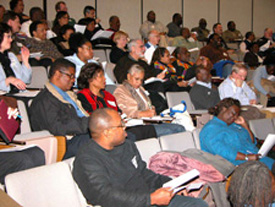 The 2007 African American Missions Strategy Seminar at Columbia International University (CIU) on January 19-20 was nearly a Homecoming to 130 African Americans and Euro Americans interested in mobilizing the African American Church for global missions. At least twenty-two predominately White missions organizations were represented, perhaps the widest such representation yet at this kind of event, and ten of these had African American representatives. At least two of the 22 are dedicated to African American mobilization. Another eight predominately African American missions organizations and movements were present. At long last we are moving together on a multi-ethnic front. Missions directors and mobilizers, members of church missions committees, pastors, missionaries, seminary students and various faculty members came to learn and network. At least a dozen Black churches were represented.
The 2007 African American Missions Strategy Seminar at Columbia International University (CIU) on January 19-20 was nearly a Homecoming to 130 African Americans and Euro Americans interested in mobilizing the African American Church for global missions. At least twenty-two predominately White missions organizations were represented, perhaps the widest such representation yet at this kind of event, and ten of these had African American representatives. At least two of the 22 are dedicated to African American mobilization. Another eight predominately African American missions organizations and movements were present. At long last we are moving together on a multi-ethnic front. Missions directors and mobilizers, members of church missions committees, pastors, missionaries, seminary students and various faculty members came to learn and network. At least a dozen Black churches were represented.
The warmth of fellowship flowed in every direction, from the registration desk to the cafeteria to the workshops and throughout the plenary sessions. The registration line became a receiving line. Clusters of friends popped up in lobbies and the dining hall, at workshops and on the sidewalks.
The centerpiece of this seminar was the African American Missions Manifesto. For almost twelve weeks a drafting committee proposed, edited, debated, and then proffered fresh topics. Chief architect was Minister Vaughn Walston, together with Rev. Gary Ham, Rev. Glenn Mason, and Dr. Jim Sutherland. Bill Porter, of Columbia International University, ably facilitated the discussions. The committee honed the document during the 24-hour gathering and after many deliberations presented the Missions Manifesto at the final plenary session. The Manifesto was approved by acclamation and then signed by all who so wished—seemingly everyone. Two delegates leaped for the signup sheet for “first signature” notoriety.
During the first two plenary sessions Rev. Gary Ham and Rev. Glenn Mason passionately presented the need for missions. Rev. Ham shared with us that "It will take wisdom and discernment on the part of leadership to rightly call out and equip the greatest generation of missionary service," our newest missionaries. Rev. Mason challenged us to “Think like God,” when it comes to missions involvement and to understand God’s purpose of the African American people group. Ten different breakout sessions spoke to a range of missions concerns. Some of these were “Strongholds and the Lack of Involvement Among African Americans in Missions,” by Rev. David Cornelius (International Mission Board of the Southern Baptist Church); “How the Bible Emphasizes Missions,” by Dr. Joseph Jeter (Have Christ Will Travel Ministries) and “An Overview of the Final Frontiers of Missions,” by Rev. Melvin Jackson (Searchlight Global Ministries). The RMNi Director taught on “Best Practices for Recruiting African American Missionaries” to about 60 persons.
One bright outcome of the Seminar is that the Manifesto may become a rallying point for engaging African Americans in global missions. We anticipate a dedicated website to post the document, with the capability to digitally endorse it. Visitors will also be able to request missions updates. We hope to include suggestions for implementing the Manifesto.
If you weren’t able to attend, CIU intends to host a followup seminar in early 2008. Drs. Joe and Peggy Rayman of Africa on Fire stirred the embers to bring this consultation together. We hope to see you in 2008, so that the many brushfires representing the work of missions large and small will join into a fire-front to spread word of Christ globally from the African American community.
Compiled by David Mays
A page from the ebook, Stuff you need to know about Doing Missions in Your Church, (an updated version is available from http://www.davidmays.org/Resources/resmays.html).
The keys to a good missions conference are purpose, prayer, planning, promotion, program, and follow up.
Select the date and make sure it doesn't conflict with anything that will compete for a large section of your congregation. Set the date well in advance, up to one year.
Recruit a respected and effective leader to head up the Conference Team. Assemble a separate conference leadership team. Include lots of people in the planning and preparation.
Most commonly neglected areas: Prayer and Follow-up
Click here for additional and innovative conference ideas, also compiled by David Mays
By Dr. Terry Hulbert, Professor of Bible at Columbia Biblical Seminary and School of Missions
In the missions enterprise, what is the local church? A bank? A finance agency? A cheering section? What is its role and responsibility? One way to grasp this is to ask another question: What steps get a person to the field as a missionary? We would probably start the list this way: "The guy or girl has to volunteer."
All right, so Sam was in a meeting, heard an appeal and volunteered. Next step? "Get him educated!" So we send him off to a good school, where he can get some training and a degree.
Third step: "Have him write to a mission board." Let's give Sam a few addresses. Before long, there's a fourth step, "Appointed by mission board," inevitably followed by number five: "Sam returns and asks the church for support." For the couple and their six kids, this means a lot of money.
Now, in most of these steps the church is either passive or displaced by the mission board or school. Not only that, but I don't think these are really the key things that will carry a pre-teen or teenager through to becoming a productive cross-cultural communicator and planter of churches.
We've already mentioned the three main factors in a missionary's career: church, training institution and mission board. Each has its role and its responsibility. But if there's overlap or if one isn't fulfilling its role and the others must fill in, there is weakness.
I think that's right where we are in missions today. Mission boards are sometimes doing what churches should do. And some churches are expecting schools to do what churches should do.
What happens at Urbana, where the computer matches so many hundreds of students with just about every mission board that participates? I'm told that even though they heard John Stott and Helen Roseveare and came out vibrant with interest, four out of five don't go anywhere in missions.
I believe one main reason for this is that churches haven't taken those people from that initial interest, concern, burden and goodwill toward missions, and moved them through to where they can be appointed and move overseas.
What is the function of the school? It gives specialized training in Bible, doctrine, cross-cultural communication, missions strategy, anthropology, music, Christian education. Most churches can't do that, though a number have set up their own lay training programs.
The school also provides some maturing (I think, for instance, of what at Columbia Graduate School we call "whole life training"), but there are limitations. For instance, in school the student is relating mostly to peers, not to a cross-section of society.
The training institution also gives some ministry experience, in churches or in jails and hospitals. It's good experience, but limited in scope and depth and often in supervision and training.
Even a school like ours, which insists that every student be a regular adherent of a church in Columbia, SC, can guarantee only minimal church experience, compared to that which students would have in their home churches.
Training institutions are very important, and a missionary would be at a great loss to go to the field without this education. But still, the school cannot do many of the things that only the church can do.
Now, another main element in a missionary career is the mission agency. What is it meant to do? Recruit volunteers? Make disciples of them? Teach and prepare them for field ministry? No.
I think the mission agency's primary responsibility is, first of all, to evaluate applicants. These people know the needs on the field. And haw can we in the local church, if we've never lived in a cross-cultural situation, assess how a person would function overseas?
Mission board home staffs usually have had considerable field experience. When someone writes to them, "I want to serve in Timbuktu with your mission," they have guidelines to evaluate personal potential and see whether the applicant is suitable, and to help him or her link up with field needs.
Then, too, the mission board provides specialized preparation for the field: orientation, indoctrination to mission practices, description of the country, the government, and the way things are done there, help in getting passports, visas, shots, language study, etc. These are things only a mission board can do not the church and not the school.
The mission board also provides administration on the field. They fit new missionaries into appropriate assignments and help them relate to the national church. They oversee the missionaries work and evaluate them, serving as agents of the local church overseas to see that they function effectively.
What does all this leave to be done? There are very important contributions that only the local church can make especially when it's the missionary's home church and it can have the continuity of years of ministry with a person or family.
One thing the church is specially fitted to do is to do is to teach biblical mission values. You can't do this thoroughly in one or two courses, or with a mission manual. The church makes serious value statements with its missions budget, with the missionary pictures it mounts on its walls, with the pastors referring not only to local situations but also to conditions and applications of truth in other cultural contexts.
The church demonstrates its values when it prays the Lord of the harvest to send out reapers, and not just to cure Aunt Suzie of the cold she's had for a week. What we pray about, how fervently, with what goals, with what attitudes toward missions and missionaries; and whether we care more about buildings and pipe organs or about people who need to hear of Jesus Christ ? all this teaches values.
The church context is also where people should learn biblical doctrine and the basics of missions. Some may study these in a seminary or Bible college, but all need to be knowledgeable in these areas, and to be at least introduced to them in one's home church. They need to learn theology and biblical content in Sunday school, in youth groups, in home Bible studies, and to relate this teaching to their personal lives and to the life of the church, at home and overseas.
A third important thing the church is best qualified to teach is interpersonal skills. Missionary candidates need to learn how to relate to all kinds of people, of all ages.
A few years ago a Navigator administrator told me that previously that organization had not planned much contact with churches, feeling that churches were not really effective in discipling. But they had come to realize that most of their people were aged 18 to 35 and weren't learning to relate to children, to teenagers and to old people. So they had started to encourage their people to become involved in local churches, where there's a broad age span. We missionaries need that kind of experience, especially in overseas ministry, where age is respected and where we will relate to a wide variety of people.
A fourth contribution: the church is where I can learn to understand myself ? who I am and why I am significant. I can learn why I have every reason to be humble before God, but that at the same time I can be completely confident that God can do something through me.
This takes place in the context of a group of people who are part of the Body of Christ. My self-image should not be rooted in psychological counseling as from the warmth of being a cell in the body, a member of a team. This is very, very important preparation for going overseas, where a sense of commitment and involvement in a team is essential.
A fifth thing the church should do is developing the person in ministry ? both to believers and to the lost. The local church is the best place for "hands-on" experience in learning to communicate biblical truth in such a way as to meet the needs of a wide variety of people.
Last on this checklist, I think the local church has a great opportunity to function as a liaison between the mission agency and individuals in the church.
We shouldn't be thinking of a spectrum, with the local church at one end and a mission agency at the other, with the volunteer going to the agency and then bouncing back to the church for references and support. Rather, there should be a team relationship, in which the church is involved with the potential candidate and also with the mission agency, and brings the two together. This adds real meaning to the term "sending church."
Now I want to suggest some ways in which a local church can and should be involved in accomplishing these goals. These are only a few of many dimensions of a sending church, but are those which often are overlooked or under-used. May God use some of the thoughts to stimulate and excite us about the potential and the unique function of the local church in preparing missionaries.
One of the greatest contributions the local church can make to worldwide evangelization is not just by giving money, but by growing missionaries. By modeling, teaching, training, motivating, counseling, encouraging, informing and challenging people from their early years into the teens and right through college, the church can move them right up to the launching pad from which they are propelled into the orbit of a cross-cultural ministry.
That is what it means to be a real "sending church"! But it doesn't just "happen." We must pray and plan and prepare for it, and commit ourselves to doing it!
First of all, I think we have to start with the home. Dick Winchell, General Director of The Evangelical Alliance Mission, says that he and his wife prayed that they wouldn't see their grandchildren till they were two or three years old, meaning that all their children would go to the field right after they were married, or would be married on the field. This kind of attitude is so important; values taught in the home can't be over-emphasized.
I am aware that many young people these days will have single parents, and there is even greater difficulty where broken homes are involved. But even a single Christian parent can model values in that difficult situation. We parents have the primary responsibility and opportunity to influence our children in their values concerning life vocation. As family members sit around and talk together about the future, there should be open interaction about the value of serving God. Children should know that their parents are asking the Lord to send out harvesters and that members of their family are not excluded from the answer to that prayer.
Children should grow up in a warm atmosphere of knowing that being a missionary is a good thing, not something you do if you can't do anything else. They should know that if they become missionaries, you wouldn't be embarrassed when you're in a conversation where people are comparing what their kids do. ( Mine's a doctor. Mine's a lawyer. Mine works in the White House. What does yours do? Oh . . .he's just a missionary. )
Attitudes need to be implanted in the home. If the parents have a concern for the lost and are praying the Lord of the harvest to send out reapers, it will have an effect on the other family members.
In the second place, the local church should teach how to make disciples. Let me read from a letter written by a mission executive:
To me the biggest deficiency we encounter in missionary candidates today is the fact that they are not disciplemakers. We get people eminently qualified in technical areas (theology, computer sciences, and management). But we're not getting people of the Word, who know how and are practicing personal evangelism and discipleship. This is the weakness of our churches, and is decidedly the weakness of our candidates. I firmly believe that a technician should be a soul winner, if he's going to be a missionary. He or she should be a real spiritual reproducer, and our churches are not turning out many of this type.
Why? After all, the Great Commission says: "When you go, make disciples." There are two ideas about what is meant by "disciples." Some take it to mean that making disciples is making converts. Others say that making disciples is developing believers.
Whatever it is, that's what missions is all about. Missions is not just operating computers, putting up radio towers, or giving injections; missions is making disciples. Thousands of different activities may be related to it, but making disciples should be the primary objective, the reason that takes people out there, whether they go as self-supported tent-makers or church-supported workers. Disciplemaking is the criterion of biblically based missions.
Now, if missionary appointees haven't learned in their churches what this is all about, they're not likely to learn it during their flight across the ocean. If, in the home church context, they've never been discipled; if they've never brought people to Jesus Christ; if they've never had the opportunity to do some discipling and see people grow under their ministry, then they're not likely ever to know how, or do it.
So what will they do overseas? They will occupy themselves in their assignments (support ministry, teaching in a school or whatever, and make that their objective). "I'm here to be a missionary teacher . . . administrator. . . technician. . . nurse" Is that person a missionary? The answer lies in whether or not he or she is a disciplemaker. And the local church is the best place to learn to do this.
The third thing that needs to be taught in the church is Bible and missions. Long before going to campuses for advanced study, the person should have learned the basics from the pulpit and in other church situations. (If they don't, they may never be motivated to go to a school to learn more!)
Don't take for granted that our young people know that the lost are lost. Don't take for granted that they understand what missions is all about just because you schedule missions speakers and films. Remember Judges 2: 10, where "another generation arose, that knew not the Lord." We may have a generation arising that knows not missions.
The fourth area is that of cross-cultural evangelism experience. If we can provide structures and means whereby out young people can become involved in cross-cultural evangelizing, it will model the concern of the church and give them invaluable experience. Young people are wise; they know that if we give tens of thousands of dollars to send someone to witness to people in Timbuktu but don't send them out locally, something is wrong. For instance, what makes Vietnamese more valuable if they're in Vietnam than if they own a restaurant downtown?
And now the Lord, in His gracious plan, has brought into North America samples of almost every culture on earth; in greater numbers, concentrations and accessibility than ever before in history. Anthropologists tell us that when people migrate, the stress of moving from one place to another and their vulnerability, especially in the early months of living in a "new world," make them more open to the gospel.
If we in the local church will make an effort to befriend and evangelize these people of other cultures, it will model our concern and provide cross-cultural experience for our members. At the same time it makes possible a unique and important ministry. For instance, tens of thousands of Muslims are studying in the United States, some 30,000 of them from Saudi Arabia; country missionaries cannot enter. There is potential for evangelizing these people and their going back and influencing others in their own countries.
Through this kind of experience as outreach from the local church, young people can assess their gifts and find out what God may want to do with them. Some will find that God hasn't gifted them in this way. On the other hand, they may find unexpected fruitfulness here, so that they can hardly wait to go overseas and continue a cross-cultural ministry.
How would the local church provide leadership for a cross-cultural outreach? Let's say there's a Latin population building up on the city, and the church supports missionaries among overseas Latinos.
When those missionaries have they next furlough and are ready to return to the field, what if the church made arrangements with them and their mission board for them to stay another six months or longer in this city, supported by the church and helping the church make up a team from among its young members, for the purpose of evangelizing and seeking to start a church among Latin people? (In some cases, retired missionaries revel in this kind of opportunity for continued evangelization, using the language in which they are fluent.
The young people on this team would have the benefit of the missionaries' experience and their knowledge of the language and cultural background, and the mission flight well recruit (and screen!) some new missionaries through the project.
This kind of work could grow as more missionaries come back and spend time in this work at church expense. The fact that the church is doing this would say many things to the young people, and could start many of them on the track to a cross-cultural ministry. Summer missions are another well-known way to introduce people to cross-cultural ministry. Short-term service by professional and skilled persons and those who have retired offers wide opportunity to demonstrate and communicate Christ's love and message and build a "sending church."
A fifth area: interpersonal relationships. I asked a missionary the other day what are the areas in which they find their new people most deficient when they arrive on the field. First, he mentioned cross-cultural evangelism. And in second place, interpersonal communication skills, relating to people. One of the greatest problems many missionaries have on the field is dealing with other missionaries.
The local group of believers can become very much involved in preparing people for this kind of challenge. The church can teach them how to deal with stressful situations. All the leaders (board, pastor, staff, Sunday school etc.) can model how you deal with people who don't agree with you. As Francis Schaeffer puts it in The Mark of the Christian, "We need to learn to not be seeking for victories, but for solutions."
Another important contribution the church can make is to take the initiative in vocational guidance, or what we might call "recruiting." In your church, who influences young people with reference to their life work, vocation, and commitment? Television personalities? A guidance officer at high school? Peers? Or is God influencing them through the church, or through concerned, informed spiritual leaders?
I believe that its every bit as right to influence believers toward seeking God's best for their life's work, as it is to influence unbelievers toward seeking salvation. This doesn't mean suddenly walking up and saying, "Sam, you should go to Timbuktu!" But, take him out for a meal, relate to him, and build a bridge of relationship and trust. (" How's it going, Sam? Where do you think you'll be going after high school? Why?") Explore his future with him, interact, ask questions, and draw him out. Help him see how precious and unique his life is, and how important right choices are now!
Remember that many high school and college young people have a low self-image. They may think they can't accomplish anything anywhere, let alone in missions. They need to be challenged with the thought that God could do something very significant and eternally important through them. This is "recruitment" in the broadest sense; taking the initiative, challenging, all the way through the teens and right on to praying the person to the field; or to whatever purpose and place in life God has planned.
My last point has to do with praying: "Pray the Lord of the harvest, that He would send forth laborers into His harvest." Schools can pray that prayer (ours does) and so can mission boards. But I think there are three special reasons why it's very important that the local church be asking God to send out reapers. First, it involves the whole church as part of a missionary team. By praying, everybody in the church (including the retired, the physically disabled, the financially limited) can take part in what is happening to bring the lost of this world to Christ.
A second reason is that everyone in the church who is praying that God will send out people is thus making himself a potential part of the answer. I can't say, "Lord, send them, but count me out." Praying for reapers opens me up, makes me vulnerable and available. The third reason is that the church, by praying this way, is recognizing that the whole matter of selecting and sending workers is in the hands of the sovereign God. He will move them to go, and He may move us to help them go or to join them in going. (If we "pray them out" we may also be responsible to "pay them out," becoming part of their support team.)
The local church, the home church, the sending church, is the key to missions. We can't delegate to schools and to mission boards that which is the function and responsibility and privilege of the sending church.
If you're a missionary candidate or are considering becoming one, I would say, let your church minister to you. Soak it up! They may not be doing all the things mentioned here, but perhaps you can help them get started on some of them. Then, too, perhaps they're doing some things you haven't recognized.
Look around, think about what needs to be done, and get involved. Commit yourself to the pastor and the leadership of the church. Ask them for help and absorb it. Be open to them to learn and grow, and to serve.
If you're a pastor or other church leader, I encourage you, if you haven't yet done so, to define your responsibility as a sending church, your role in missions. See it as a role that doesn't overlap with the place of schools and mission boards. Instead, it's complementary; they can't function properly unless you and your church are doing your part, and you need them.
Once your role is clearly understood and acknowledged, establish your responsibilities and plan how you will get on with the job, the in-depth, continuous growing of your own missionaries. Your church can be, in very sense, a SENDING CHURCH!
(This message, edited and published by Worldteam, was presented by Dr. Terry Hulbert, Dean of Columbia Biblical Seminary and School of Missions, Columbia, SC, on February 11, 1984, at the ACMC Conference on Missionary Preparation. ©1984, Association of Church Missions Committees. Used by permission.)
Four articles from Dr. Michael Johnson, an African American missionary surgeon, serving in Kenya with his wife Kay, since 1990.
Dr. Michael Johnson has a powerful powerpoint presentation on Divine Dissatisfation.
Charisma magazine's Andy Butcher surveyed African American missions in February, 2000.
Many impediments to global missions are gone or greatly reduced. Here are 12 reasons to hope for a resurgence of Black global missions.
Can people who have never heard of Christ and have not rejected him be saved? Dr. Tony Evans' has developed the doctrine of "transdispensationalism," which answers in the affirmative. Go here for the background and a reply to Dr. Evans' views on this matter.
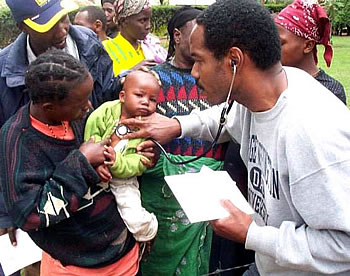
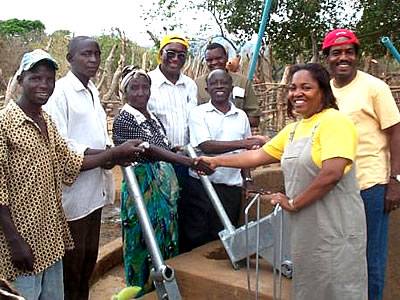 Dr. Michael Johnson is an African American missionary surgeon, who served in Kenya with his wife Kay, from about 1990 until 2011. While continuing orphan care in Kenya, they now are located in the Philadelphia area and have begun ministry to ex-offenders, to those with unwanted pregnancies, and to people needing health care. Their website is: https://thosepeculiarjohnsons.org/. Dr. Johnson can write with a scalpel, as well as operate with one, excising and bringing healing.
Dr. Michael Johnson is an African American missionary surgeon, who served in Kenya with his wife Kay, from about 1990 until 2011. While continuing orphan care in Kenya, they now are located in the Philadelphia area and have begun ministry to ex-offenders, to those with unwanted pregnancies, and to people needing health care. Their website is: https://thosepeculiarjohnsons.org/. Dr. Johnson can write with a scalpel, as well as operate with one, excising and bringing healing.
Dr. Johnson presented a comprehensive view of his ministry and the African American church and missions at the African American Missions Seminar at Columbia International University in January 2008. View (and download) the PowerPoint presentation from that conference, which he kindly shared with us.
 The 2008 revised edition of his very insightful and provocative book Making the Blind Lame: What Jesus Wouldn't Do can be purchased at bookstores such as Amazon or by contacting Paula Kushman at World Gospel Mission, POB 948, Marion IN 46952-0948. You may also order by phone by calling 765-671-7206 Monday, Wednesdays and Fridays (or leave a message any day). The cost is $12.00 and shipping is about $3.00.
The 2008 revised edition of his very insightful and provocative book Making the Blind Lame: What Jesus Wouldn't Do can be purchased at bookstores such as Amazon or by contacting Paula Kushman at World Gospel Mission, POB 948, Marion IN 46952-0948. You may also order by phone by calling 765-671-7206 Monday, Wednesdays and Fridays (or leave a message any day). The cost is $12.00 and shipping is about $3.00.
Page 2 of 4